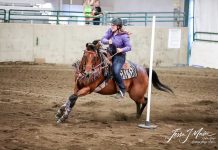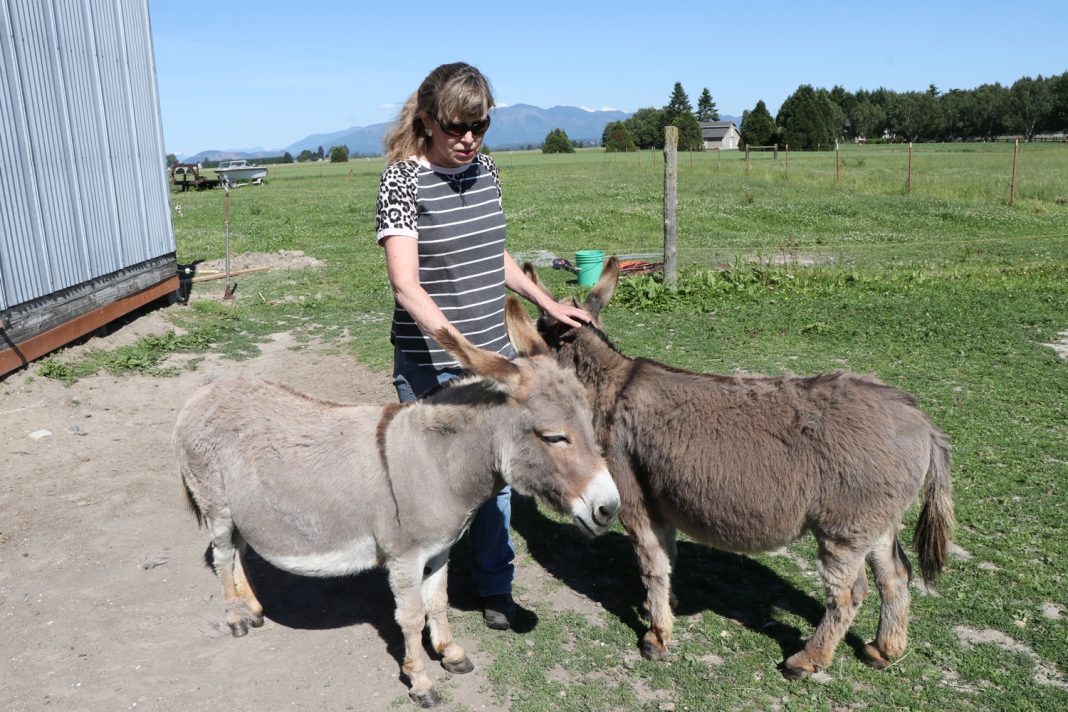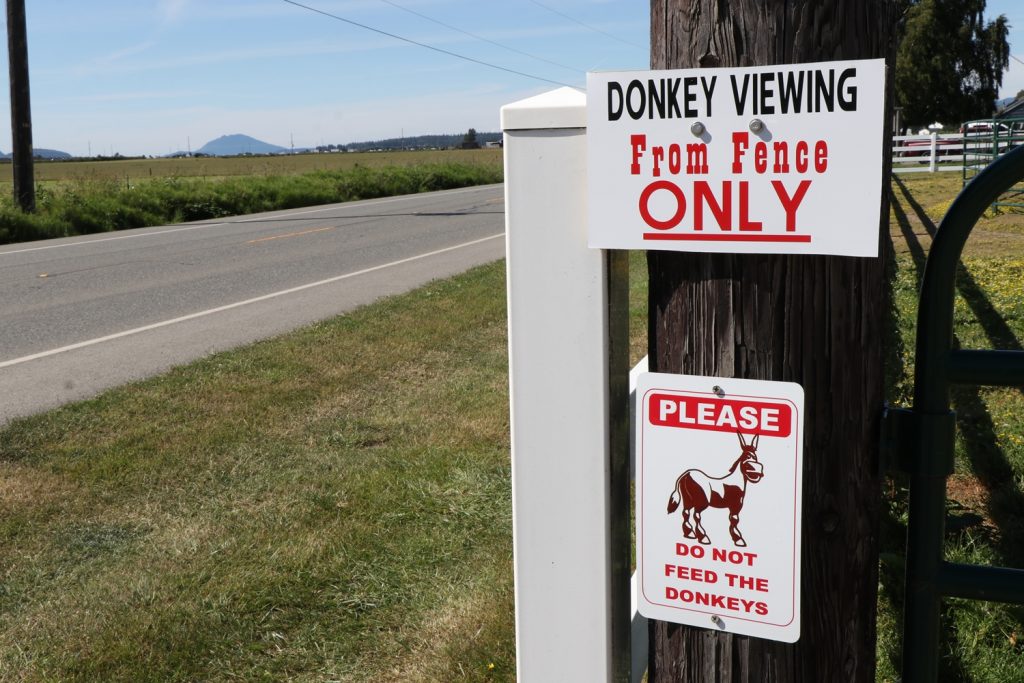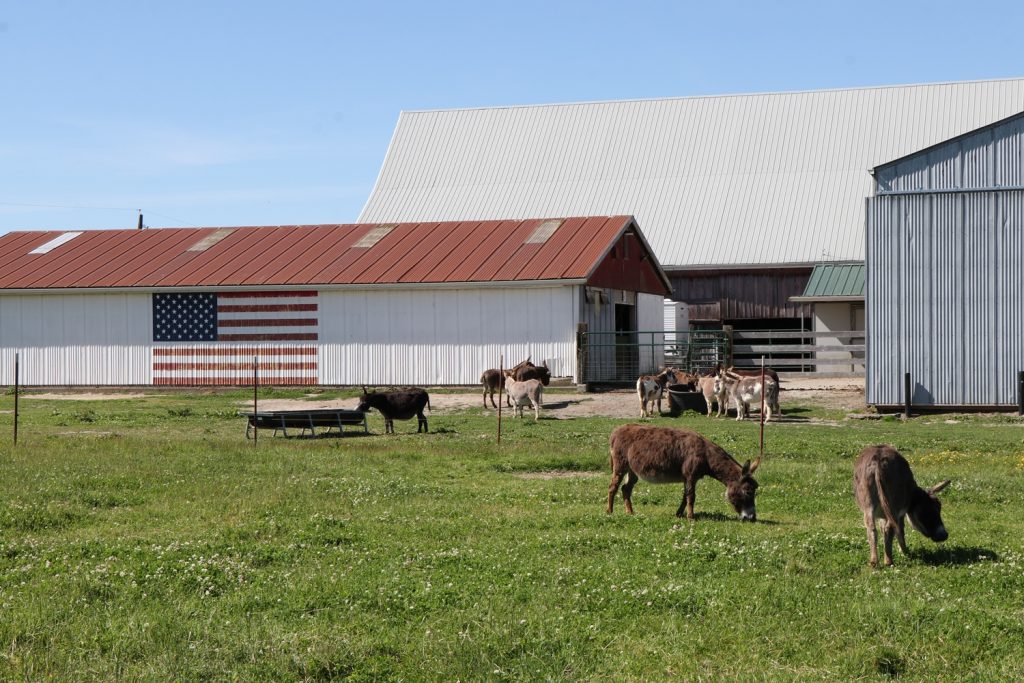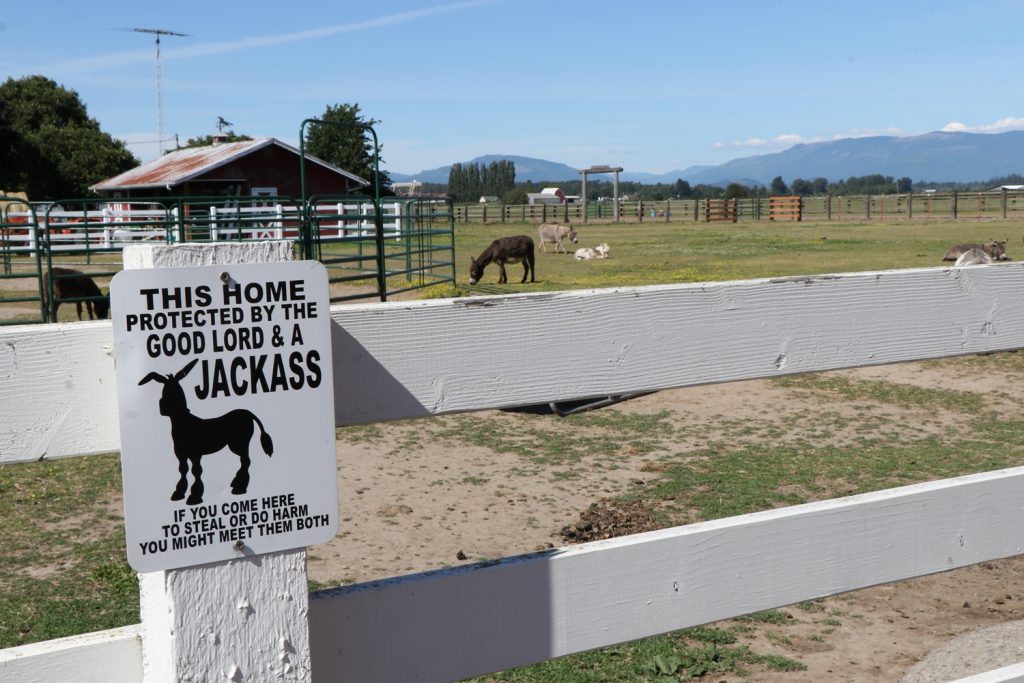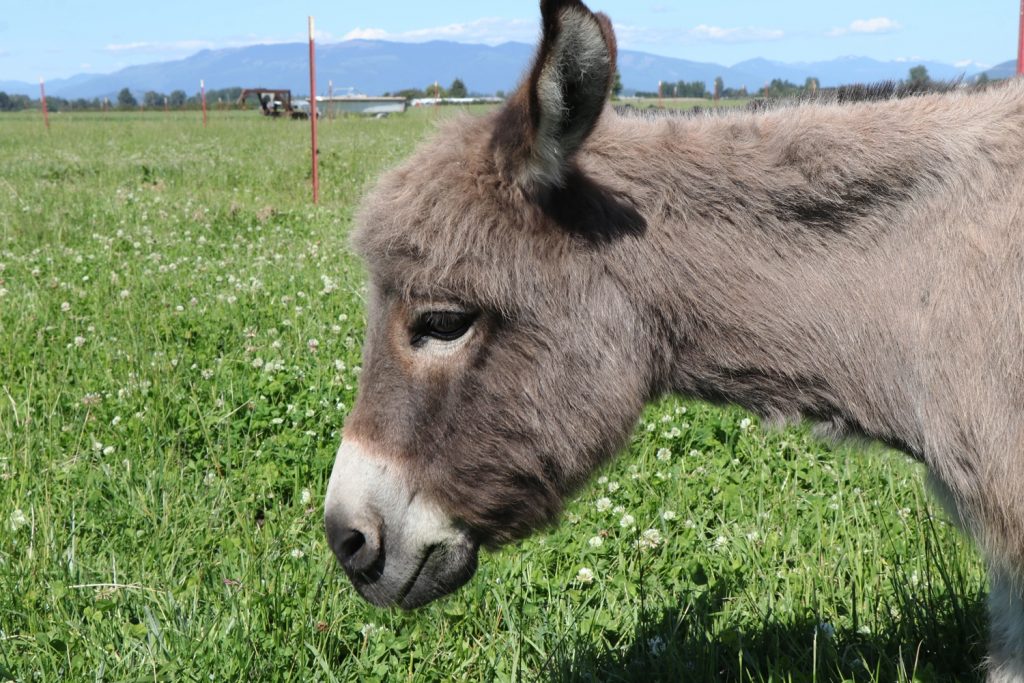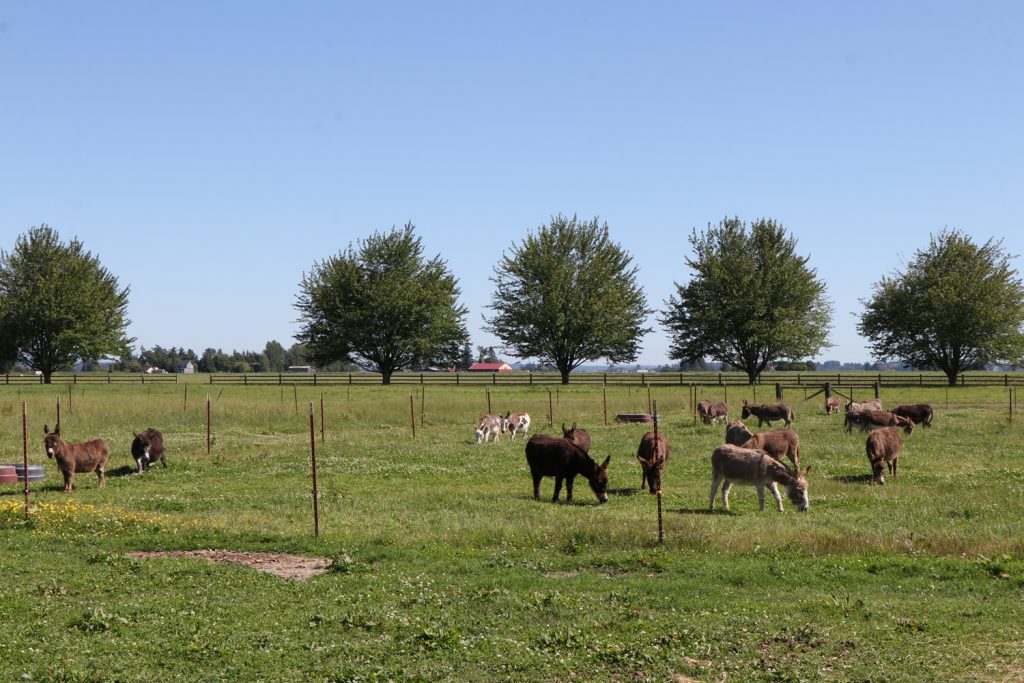On a plot of land six miles west of Mount Vernon, there is a place where cuteness comes in herds. A stone’s throw from State Route 20, you will find JF Miniature Donkeys, a nearly 60-acre ranch that breeds and sells miniature donkeys: the smallest naturally-occurring donkey breed in the world. Here, every day, you can see dozens of the adorably furry creatures grazing on grass, standing no more than three feet tall as measured from their withers (a bump where the shoulders and back meet) to the ground.
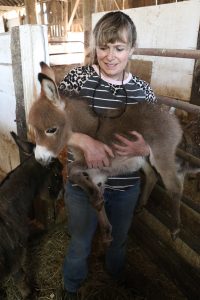
The ranch is owned and managed by Julie Jones, a Skagit County native whose late father – a World War II veteran and Pearl Harbor survivor – ran a local dairy farm for several decades after the war.
Jones, who operates the ranch with help from her husband Todd and another local friend skilled with mini-donkeys, says she’s been raising livestock her entire life. In 1989, she became an office manager for one of the country’s leading Arabian horse breeding facilities, overseeing every aspect of the operation.
By the mid-1990s, Jones and her husband were raising, showing and selling performance quarter horses across the country. But in the late 1990s, she saw her first miniature donkey and was smitten. Jones purchased her first pair of donkeys: a male (called a jack) and a female (called a jenny) from a farm owned by Loyal McMillan, a member of the Nordstrom department store family.
In the early 2000s, Jones began buying many more donkeys from other states, initially doing so without her husband knowing about it, she says with a laugh. Now, her ranch is home to about 60 miniature donkeys that make up one of the premiere herds in United States, and she’s sold them to people as far away as Hawaii and France.
“They’re just so fun,” she says of her donkeys. “There’s just something calming about them.”
Way of the Donkey
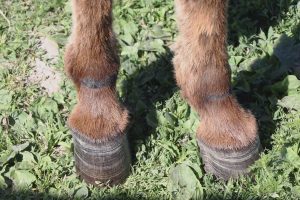
Miniature Donkeys were originally imported to the United States from the Italian islands of Sicily and Sardinia in the 1920s. Since their introduction to the U.S., miniature donkey numbers have grown into the tens of thousands while diminishing in Italy, leading to bans on their importation.
While donkeys are traditionally thought of as stubborn and potentially mean, Jones says, in general, they are actually intelligent and self-aware, and are easily trained once they gain the trust of their owners through patience and kindness.
Miniature donkeys in particular, she adds, are incredibly friendly and affectionate, and their docile nature, loyalty and playfulness make them ideal pets. “They’re perfect with little kids or the elderly,” Jones says. “That’s why their popularity took off. One of our customers said that he stopped by and played fetch with one of his donkeys every day. They’re just really smart.”
Over the years, Jones has sold several donkeys to people for use as therapy animals, comforting people in hospice care, nursing homes, assisted living facilities, and socializing with autistic and troubled children. She also sold a pair of donkeys to a couple of Seattle-area doctors, who take them on daily neighborhood walks and even dress the donkeys up on holidays.
One of her female donkeys, Miss Daisy, has enjoyed special notoriety, appearing on the cover of a high-end children’s catalog, helping Santa Claus greet local children at Christmas, and marching in local parades.
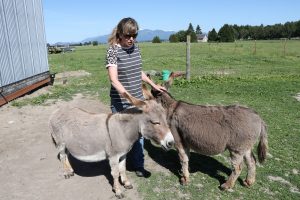
Jones has also taken her donkeys to various regional and national shows in past years, training them to navigate obstacles, barrel race, and even jumping, the miniature donkey equivalent of high hurdles. Jones says they can easily jump higher than their own height.
As herd animals with an especially social nature, miniature donkeys usually bond closely with at least one other donkey. For this reason, Jones only sells her donkeys in pairs, unless the buyer is a breeder who already has multiple donkeys.
“They have to have a buddy,” she says, recalling the story of a person she knew who bought property that came with an elderly goat and one miniature donkey. Once the goat died, Jones says, the donkey became highly distraught.
Donkey Dollars
Standing beside donkeys with names like Lucky Charm (born on St. Patrick’s Day), Skittles, Super Mario and The Whizard of Awes, and watching small, Pig-Pen-like swirls of dust poof out of their thick coats when she pets them, it’s easy to understand why business is brisk for Jones.
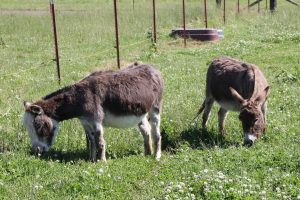
Last year, during the height of the COVID-19 pandemic, she says people were clamoring to buy miniature donkeys, as they were many types of domestic animals. “I have inquiries from all over the world,” she says. “It’s a pain to send them overseas; you have to do a lot more work. So, I kind of like selling them in the U.S.”
The Jones’ donkeys sell on average from $2,500 to $3,500 per animal. She doesn’t keep a waiting list, but once she receives an inquiry, she’ll interview potential buyers about the environment she’ll be sending her donkeys to live. “I’m very picky about where they go,” she says. “They have to have enough acreage, they have to have shelter. I want to make sure the owners are going to be committed to them, because they can live to be 35 years old.”
The donkeys are usually sold at birth, sometimes literally. Once, Jones says a couple bought a donkey based off a picture in which the newborn was only halfway out if its mother. After birth, Jones raises and trains the growing donkeys, weaning them from their mothers around five months and waiting several weeks after they’ve bonded with another donkey to ship them to their new home. On average, Jones sells 20-25 babies per year, she says.
“These guys are so easy,” she says of miniature donkeys, in comparison to breeding horses. “They’re so healthy. They rarely have an issue. These guys are just happy.”
And that happiness certainly extends to the people who drop by to see the donkeys grazing. While Jones is often too busy to give tours of her ranch, she encourages people to respectfully visit the fence line and watch the donkeys. Every four years, tulips also bloom on her property, further increasing interest in her adorable menagerie of creatures.
Raising miniature donkeys is a full-time job for Jones, but she says she’d be hard-pressed to find a job more enjoyable. “Why wouldn’t you enjoy it?” she says with a laugh.
JF Miniature Donkeys
14535 Best Road, Mount Vernon






